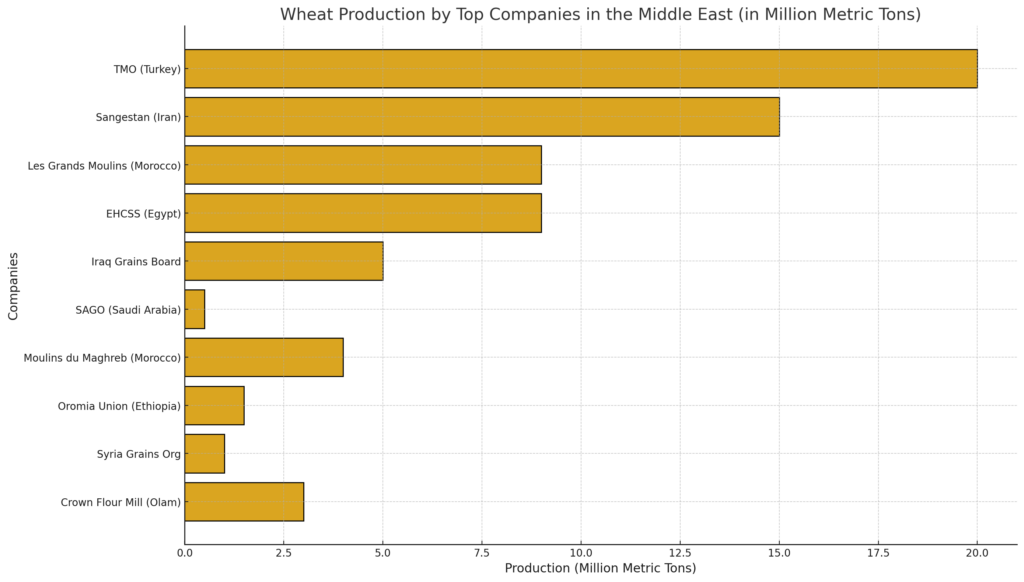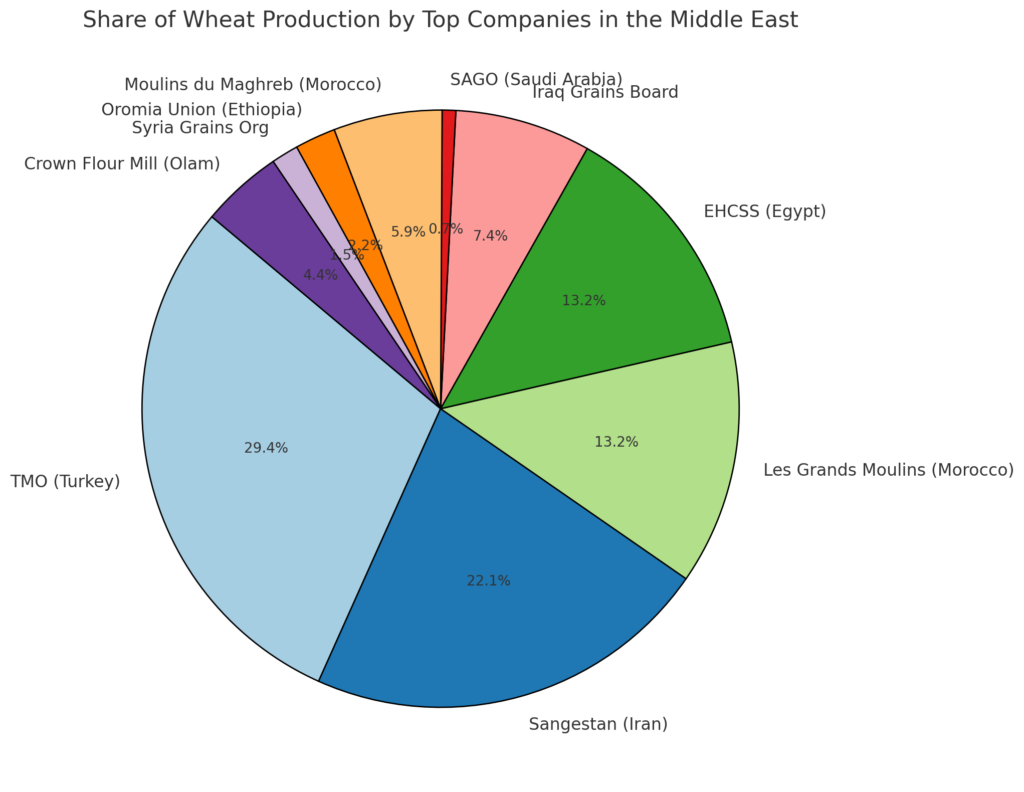The Middle East is home to significant wheat production, supported by a combination of government initiatives, private sector investments, and advanced agricultural techniques. While challenges like water scarcity and climate variability exist, these companies play a crucial role in ensuring food security. This report highlights the top 10 wheat-producing companies in the Middle East, their operations, and their contributions to the agricultural sector.
🚀 Supercharge Your Insights with ESS Pro
Access over 50,000 expert market reports and connect with more than 500,000 verified industry contacts across the global food & beverage value chain.
Includes exclusive insights, top 10 rankings, live market indicators, and up to 10 custom research reports annually.
🔓 Join ESS Pro – Unlock Full Access

1. TMO (Turkey Grain Board) – Turkey
The Turkey Grain Board (TMO) is the country’s leading institution for wheat production and management.
Key Highlights:
- Role: Oversees production, procurement, and distribution of wheat.
- Infrastructure: Manages large-scale storage facilities and processing units.
- Contribution: Stabilizes wheat prices and supports local farmers.
- Innovation: Implements smart agriculture programs for sustainable wheat farming.
TMO is pivotal in maintaining Turkey’s position as the region’s top wheat producer.
2. Sangestan Agricultural Company – Iran
Sangestan Agricultural Company is a major player in Iran’s wheat industry, focusing on advanced cultivation methods.
Key Highlights:
- Farming Practices: Employs mechanized farming and efficient irrigation systems.
- Production Volume: Significant contributor to Iran’s annual wheat output.
- Sustainability: Focuses on water-saving techniques.
- Market Role: Supplies wheat to local markets and government reserves.
Sangestan’s innovative practices boost Iran’s wheat self-sufficiency.
3. Les Grands Moulins du Maroc – Morocco
Les Grands Moulins du Maroc is a major wheat producer and processor in the region, contributing significantly to Morocco’s agriculture.
Key Highlights:
- Operations: Large-scale milling and distribution of wheat products.
- Infrastructure: Operates modern processing facilities across the country.
- Market Reach: Supplies local markets and exports to neighboring countries.
- Technology: Adopts advanced milling technologies.
This company plays a critical role in Morocco’s wheat value chain.
4. Egyptian Holding Company for Silos and Storage (EHCSS) – Egypt
EHCSS manages wheat storage and distribution in Egypt, supporting local production.
Key Highlights:
- Operations: Oversees large-scale silo networks.
- Support Services: Procures wheat from local farmers at guaranteed prices.
- Innovation: Uses advanced storage technology to minimize post-harvest losses.
- Impact: Enhances food security in the region.
EHCSS ensures efficient handling of Egypt’s wheat production and imports.
5. Iraq Grains Board – Iraq
The Iraq Grains Board supports the country’s efforts to rebuild its wheat industry post-conflict.
Key Highlights:
- Farming Support: Provides resources and training to smallholder farmers.
- Procurement: Manages wheat purchase and distribution.
- Market Role: Stabilizes local wheat prices and ensures supply for domestic consumption.
- Challenges: Works to overcome infrastructure and irrigation limitations.
The Iraq Grains Board is key to revitalizing Iraq’s agricultural economy.
6. Saudi Grains Organization (SAGO) – Saudi Arabia
SAGO oversees Saudi Arabia’s strategic wheat reserves and supports controlled domestic production.
Key Highlights:
- Role: Manages imports and limited local wheat cultivation.
- Infrastructure: Operates advanced grain silos and distribution networks.
- Market Impact: Ensures consistent supply for the domestic market.
- Sustainability: Focuses on reducing water usage through controlled farming.
SAGO’s strategic approach balances food security with resource conservation.
7. Moulins du Maghreb – Morocco
Moulins du Maghreb specializes in wheat milling and processing, contributing to Morocco’s agricultural economy.
Key Highlights:
- Operations: Processes millions of metric tons of wheat annually.
- Market Reach: Supplies high-quality wheat products for local and export markets.
- Sustainability: Implements eco-friendly milling practices.
- Innovation: Utilizes cutting-edge milling technologies.
Moulins du Maghreb enhances Morocco’s wheat production and processing capabilities.
8. Oromia Cooperative Union – Ethiopia
Though Ethiopia is not traditionally Middle Eastern, it is closely tied to the region’s wheat trade, and Oromia Cooperative Union contributes significantly.
Key Highlights:
- Farming Practices: Aggregates wheat from thousands of smallholder farmers.
- Processing: Supplies wheat to local and neighboring markets.
- Economic Role: Supports rural communities through cooperative farming models.
- Innovation: Focuses on improving farming techniques.
The Oromia Cooperative Union strengthens regional trade ties in the wheat sector.
9. Syria Grains Organization – Syria
The Syria Grains Organization focuses on stabilizing wheat production amidst ongoing challenges.
Key Highlights:
- Operations: Supports farmers in wheat cultivation.
- Infrastructure: Manages grain storage and distribution networks.
- Focus: Ensures food security despite conflict-related disruptions.
- Challenges: Rebuilding infrastructure and irrigation systems.
The Syria Grains Organization is vital to maintaining Syria’s wheat supply.
10. Crown Flour Mill (Olam Group) – Regional
Crown Flour Mill operates across the Middle East and Africa, contributing to wheat production and processing.
Key Highlights:
- Scale: Large-scale milling facilities across the region.
- Market Reach: Supplies wheat-based products to multiple Middle Eastern countries.
- Sustainability: Invests in eco-friendly practices and farmer training.
- Focus: Combines local sourcing with strategic imports.
Crown Flour Mill connects multiple Middle Eastern markets through its operations.

Key Factors Driving Wheat Production in the Middle East
- Government Support: Policies and subsidies encourage wheat farming.
- Technological Advancements: Precision agriculture and smart farming techniques.
- Regional Collaboration: Trade agreements support cross-border wheat markets.
Challenges in Wheat Production
- Water Scarcity: Limits irrigation and wheat farming expansion.
- Climate Change: Inconsistent rainfall and rising temperatures affect yields.
- Conflict and Instability: Disrupt agricultural activities in certain areas.
Conclusion
The top wheat-producing companies in the Middle East, including TMO, Sangestan Agricultural Company, EHCSS, and SAGO, play a vital role in driving the region’s agricultural sector. By leveraging innovation, sustainability, and strategic collaborations, these organizations ensure food security and economic stability despite challenges.



